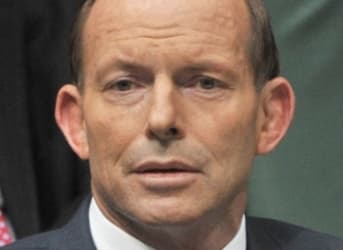One year into his term, Australian Prime Minister Tony Abbott has pulled out all stops to make life easier for extractive industries, effectively turning Australia into a paradise for fossil fuel development.
The conservative leader made scrapping a controversial carbon tax a central pillar of his administration’s agenda and savored the victory when the levy was repealed. Global reaction wasn’t as enthusiastic. Although previous governments had made Australia a leader on climate change, under Abbot, it became the first country to remove a price on greenhouse gases.
The move was slammed by environmentalists around the world, who said it would not only make it more difficult for Australia to meet its own climate targets, but would also undermine an effort to reach an international agreement to limit carbon emissions. Australia is expected to suffer from an increase in wildfires, floods, and drought in the coming years as a result of climate change.
Abbot’s pro-mining agenda has also included the recent repeal of a tax on the profits of mining companies. The 22.5 percent tax only affected large mining companies, but Abbott blamed it for starving Australia of jobs and investment, calling it “possibly the most stupid tax ever devised” in a speech to lawmakers.
Australia’s economic growth hasn’t been as brisk as in years past, but that’s more because of a slowing Chinese economy rather than stiff taxes on extractive industries. Australia sends more than 25 percent of its exports to China. Moreover, about half of its total exports are minerals and other fossil fuels. So its commodity-driven economy benefitted enormously from insatiable Chinese demand for things such as iron ore, coal, copper, steel and natural gas.
But such dependence on commodities leaves Australia vulnerable to periods of weak demand, and like all commodity cycles, booms are followed by busts as new supplies come online and demand cools. “Evidence is mounting that the ‘super cycle’ in commodity prices has ended,” investment bank UBS said in a report earlier this year. Australia rode the wave of the commodity boom, but now that the tide is rolling out, its economy is feeling the pain.
In response, Abbott has doubled down. Instead of negotiating a pivot away from an economy heavily dependent on commodities, his major initiatives continue to focus on supporting the mining industry.
His success in repealing the carbon tax and mining tax was a message to international companies looking to develop Australia’s natural gas, coal, and iron ore that the country is “open for business,” which is what Abbott declared in his victory speech on election night last September.
Although Abbott’s government has racked up victories in clearing the way for business, he has taken his lumps in the court of public opinion. In the name of balancing the books, he has had to slash popular social spending. After only 10 months in office, his approval rating dropped to just 34 percent in July, 10 points lower than the opposition leader’s approval rating.
Australians are unhappy about Abbot initiatives like a plan to dump dredged mud in the waters around the Great Barrier Reef, the largest living organism on the planet.
To clear the way for a coal export terminal, the government approved a proposal to dredge up an estimated 3 million cubic meters of mud that would then be dumped on the Great Barrier Reef. But the public outcry forced Abbott to work behind the scenes to get the company involved in the project, the Adani Group, to submit a revised plan that avoids damaging the UNESCO World Heritage Site.
ADVERTISEMENT
It was a rare defeat for the man determined to buck the global trend toward greater concern for the environment, and turn Australia into a fossil fuel utopia.
By Nick Cunningham of Oilprice.com


















